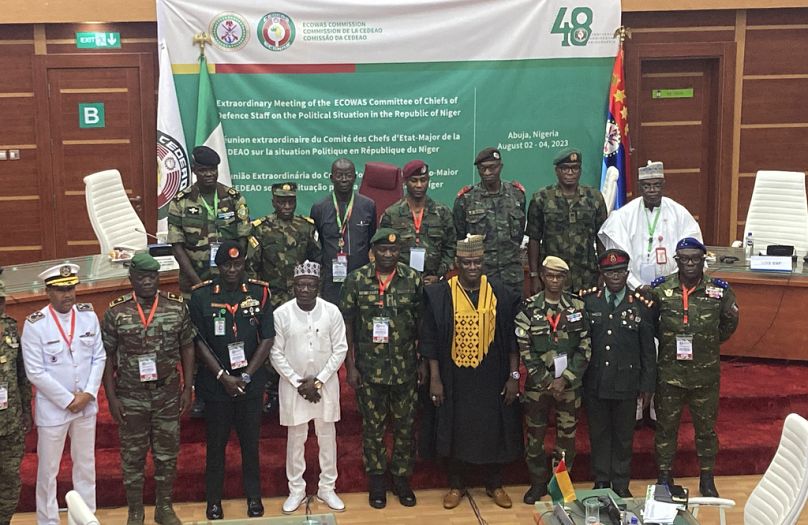
Leaders of West Africa’s regional bloc said Monday that they would meet later this week to discuss next steps after Niger’s military junta defied a deadline to reinstate the country’s ousted president while its mutinous soldiers closed the country’s airspace and accused foreign powers of preparing an attack.
 ADVERTISEMENT
ADVERTISEMENTThe meeting was scheduled for Thursday in Abuja, the capital of neighbouring Nigeria, according to a spokesman for the ECOWAS bloc.
In Niger, state television reported the junta’s latest actions Sunday night, hours before the deadline set by ECOWAS, which has warned of using military force if the democratically elected President Mohamed Bazoum is not returned to power.
A spokesman for the coup leaders, Colonel Major Amadou Abdramane, noted “the threat of intervention being prepared in a neighbouring country,” and said Niger’s airspace will be closed until further notice. Any attempt to fly over the country will be met with “an energetic and immediate response.”
The junta also claimed that two central African countries were preparing for an invasion, but did not name them. It called on Niger’s population to defend the nation.
The United States said on Monday that it is still possible to put an end to the coup through diplomacy.
“It is still possible. We believe that the junta should withdraw and allow President (Mohamed) Bazoum to resume his duties”, State Department spokesman Matthew Miller told reporters.
The use of force is a solution of “last resort” for ECOWAS, said Matthew Miller, adding that the United States was “focused on finding a diplomatic solution.
The coup toppled Bazoum, whose ascendency was Niger’s first peaceful, democratic transfer of power since independence from France in 1960. The coup also raised questions about the future of the fight against extremism in Africa’s Sahel region, where Russia and Western countries have vied for influence.
International airlines have begun to divert flights around Niger, which the United States and others had seen as the last major counterterrorism partner in the Sahel, south of the Sahara Desert, where groups linked to al-Qaida and the Islamic State group are expanding their influence.

Region divided
Also Monday, Mali said it and Burkina Faso, both neighbours of Niger run by military juntas, were sending delegations to Niger to show support. Both countries have said they would consider any intervention in Niger as a declaration of war against them.
The Associated Press saw several security officers from Burkina Faso at a hotel in Niger’s capital.
 ADVERTISEMENT
ADVERTISEMENTRegional tensions have mounted since Niger’s coup nearly two weeks ago, when mutinous soldiers detained Bazoum and installed Gen. Abdourahmane Tchiani, former head of the presidential guard, as head of state. Analysts believe the coup was triggered by a power struggle between Tchiani and the president, who was about to fire him.
It was not immediately clear what ECOWAS leaders will do now. The region is divided on a course of action. There was no sign of military forces gathering at Niger’s border with Nigeria, the likely entry point by land.
Nigeria’s Senate has pushed back on the plan to invade, urging Nigeria’s president, the bloc’s current chair, to explore options other than the use of force. ECOWAS can still move ahead, as final decisions are made by consensus by member states.
Guinea and neighbouring Algeria, which is not an ECOWAS member, have come out against the use of force. Senegal’s government has said it would participate in a military operation if it went ahead, and Ivory Coast has expressed support for the bloc’s efforts to restore constitutional order.
The junta does not appear interested in negotiation. An ECOWAS delegation sent to Niger last week for hours of talks was not allowed to leave the airport and met only with Tchiani’s representatives.
 ADVERTISEMENT
ADVERTISEMENTThe junta has also asked for help from the Russian mercenary group Wagner, which operates in a handful of African countries, including Mali, according to Wassim Nasr, a journalist and senior research fellow at the Soufan Center.
US officials say they are still able to communicate with Bazoum and that their most recent contact was Monday.
Two officials said the administration of US President Joe Biden intends to maintain both a diplomatic and military presence in Niger for the foreseeable future.
The administration is still weighing whether the developments amount to a coup, according to the officials, who spoke on condition of anonymity to discuss private diplomatic discussions. They said there was still time for Niger’s military leaders to reverse course.
If the US determines that a democratically elected government has been toppled by unconstitutional means, federal law requires a cutoff of most American assistance, particularly military aid.
 ADVERTISEMENT
ADVERTISEMENTPro-junta rallies in Niamey
Since the coup, extremists have been ecstatic because they are able to move around more freely without fear of attack, Boubacar Moussa, a former jihadi fighter, told the AP. He had joined a nationwide program that encourages fighters to defect and reintegrate into society. The program’s fate is unclear.
Moussa said he’s received at least 10 phone calls from active jihadis in the Tillaberi region near the Mali border who said there’s been no concern about airstrikes. If there’s a military intervention by ECOWAS, they likely will attack the capital, Niamey, he said.
At a rally on Sunday, thousands cheered junta leaders who said their loyalty would be repaid.
“We are with you against them. We will give you the Niger that you are owed,” Brig. Gen. Mohamed Toumba said. After his speech, rallygoers beheaded a chicken decorated in the colours of former colonizer France.

The junta is exploiting anti-French sentiments to shore up its support base and has severed security ties with France, which still has 1,500 military personnel in Niger for counterterrorism efforts.
On Monday, France’s Ministry of Foreign Affairs formally discouraged any travel to Niger, Burkina Faso or Mali, and called on French nationals to be extremely vigilant. France has suspended almost 500 million euros ($550 million) in aid to Burkina Faso.
It’s not clear what will happen to the French military presence, or to the 1,100 US military personnel also in Niger.
Many people, largely youth, have rallied around the junta, taking to the streets at night to patrol after being urged to guard against foreign intervention.
“While they (jihadists) kill our brothers and sisters … ECOWAS didn’t intervene. Is it now that they will intervene?” said Amadou Boukari, a coup supporter at Sunday’s rally. “Shame on ECOWAS.”





